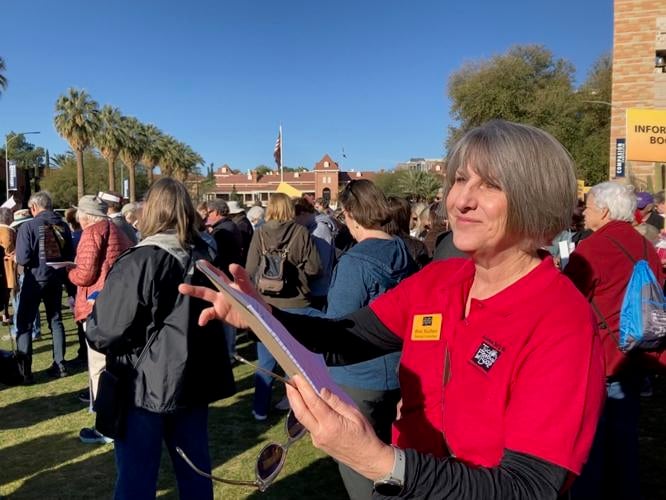In her professional life, Bimi Huebner was an engineer who helped manage nuclear weapon systems for the United States Navy … perfect training, as it happened, for the job she does now.
Today she helps coordinate the 1,200 volunteers who will stage the Tucson Festival of Books next weekend at the University of Arizona.
“You’d be surprised how often my old work life comes in handy,” she laughed.
Together with friend and co-chair LaDonna Aronoff, Huebner has been working the last nine months to recruit, schedule and train the workforce that will turn on the lights Saturday morning and put out the cat Sunday night.
Are they ready?
“Not yet, but we’re getting there,” Bimi said. “By the time we start our setup we should be close.”
Engineers such as Huebner know it is technically impossible for bumblebees to fly. The same might be said for book festivals, too.
Consider this: Next week’s Tucson Festival of Books, on March 4 and 5, will involve more than 300 authors, attract more than 100,000 people and cost more than $1 million to stage.
Now this: the festival employs only one full-time staffer, Executive Director Melanie Morgan.
She is helped by three part-time specialists in the months leading up to the event, but most of the lifting each year is done by community volunteers.
Volunteers invite the authors, woo the sponsors, reach out to vendors, and schedule the weekend’s activities. They drive authors from the airport to their hotels. They will help visitors navigate the campus on both days.
“Without them, we couldn’t exist,” Morgan said, simply.
Cue Huebner and Aronoff, who are themselves volunteers, to make sense of it all.
Huebner helped stage the first Tucson festival in 2009. She later connected with Aronoff through Pi Beta Phi, their college sorority and an active participant in the book festival since inception. Last summer, the two women agreed to re-tool and re-energize the festival’s volunteer program.
In some ways, it was a start-up.
“We came up short on volunteers last year,” Aronoff said. “It was nobody’s fault, it’s just that we hadn’t had a live festival since 2019. Some of our people had just moved on to other things. And then the COVID numbers started surging again just when we started looking for new volunteers. People didn’t want to go out. We were all worried about big crowds.”
Huebner and Aronoff drew up a grid of volunteer slots they wanted to fill for next weekend’s festival. The total came to 2,400 slots, some 2,000 hours of time.
They then developed a list of local schools, businesses and organizations that might help identify potential volunteers.
“We wanted to be proactive this time,” Huebner said. “We didn’t want to wait for people to come to us; we wanted to go out looking for them.”
Their message?
“This is our festival, Tucson’s festival, something we can all do together,” Huebner said. “It’s fun, it’s free, and it’s something we can all feel good about. Did I mention it’s fun?”
With the event now one week away, the volunteer force is almost back to pre-COVID levels.
“The last time I checked, we had 1,159 people,” Huebner said. “Many of them are taking more than one slot, so we have around 95% of our slots filled. Naturally, the most important jobs are the hardest to fill. We still need some drivers. If you’d like to meet a few authors next weekend, please let us know.”
It is impossible to measure how much volunteers mean to the book festival, but Aronoff said it is still fun to try.
“Just next weekend our volunteers will donate around 19,000 hours of time,” she said. “If we paid them minimum wage, it would cost $250,000, and most of these people are worth way more than minimum wage.”
It’s not too late to sign up as a festival volunteer, Aronoff said. A small number of shifts are still available. If you are interested, email Huebner and Aronoff at volunteers@tucsonfestivalofbooks.org.
FOOTNOTES
The UA Poetry Center will host a celebration of life and legacy honoring the late Richard Shelton Saturday, March 4, at 6 p.m. It is scheduled for book festival weekend so Shelton’s out-of-town colleagues can attend while in Tucson. Shelton was an important part of the Poetry Center for almost 60 years. He authored 11 books of poetry and creative nonfiction. In 1974, he established the prison writing workshop program that continues today. Shelton died on Nov. 29 at the age of 89.
Book Festival Sunday will certainly be buzz-worthy. At 1 p.m., Linda Ronstadt and co-author Lawrence Downes will discuss her recently released memoir, “Feels Like Home.” Three hours later, U.S. Sen. Bernie Sanders and co-author John Nichols will talk about their new book: “It’s OK to be Angry About Capitalism.” Both sessions are scheduled for the UA Student Union Ballroom.
One of the unsung heroes of the book festival is the local chapter Pi Beta Phi. All Pi Phis focus on literacy, and the 400 active members at UA take their role seriously. They have collected 5,000 children’s books and will give them away to kids during next week’s festival.
A University of Michigan study found that older adults engaging in this activity are less likely to feel isolated.





